Public Health Master's: Healthcare Learning Experience Reflection
VerifiedAdded on 2022/11/25
|8
|1690
|386
Essay
AI Summary
This essay is a reflective piece by a student pursuing a Master's in Public Health, detailing their experiences and motivations. The author uses the Driscoll model (What? So what? Now what?) to analyze a past clinical experience during their Bachelor of Nursing, where they encountered significant health disparities in a community. The essay explores the student's initial confusion about their master's degree choice, their realization of the need for public health interventions, and their decision to pursue a Master's in Public Health. The student reflects on the lack of access to healthcare, poor living conditions, and the prevalence of diseases like tuberculosis, dengue, and diabetes in the community. They discuss how this experience has prepared them for the course, set goals for their studies, and outline plans to manage and monitor their learning, including online quizzes and community involvement. The essay concludes with the student's vision for applying their studies to address health inequalities and provide better healthcare access to underserved populations.
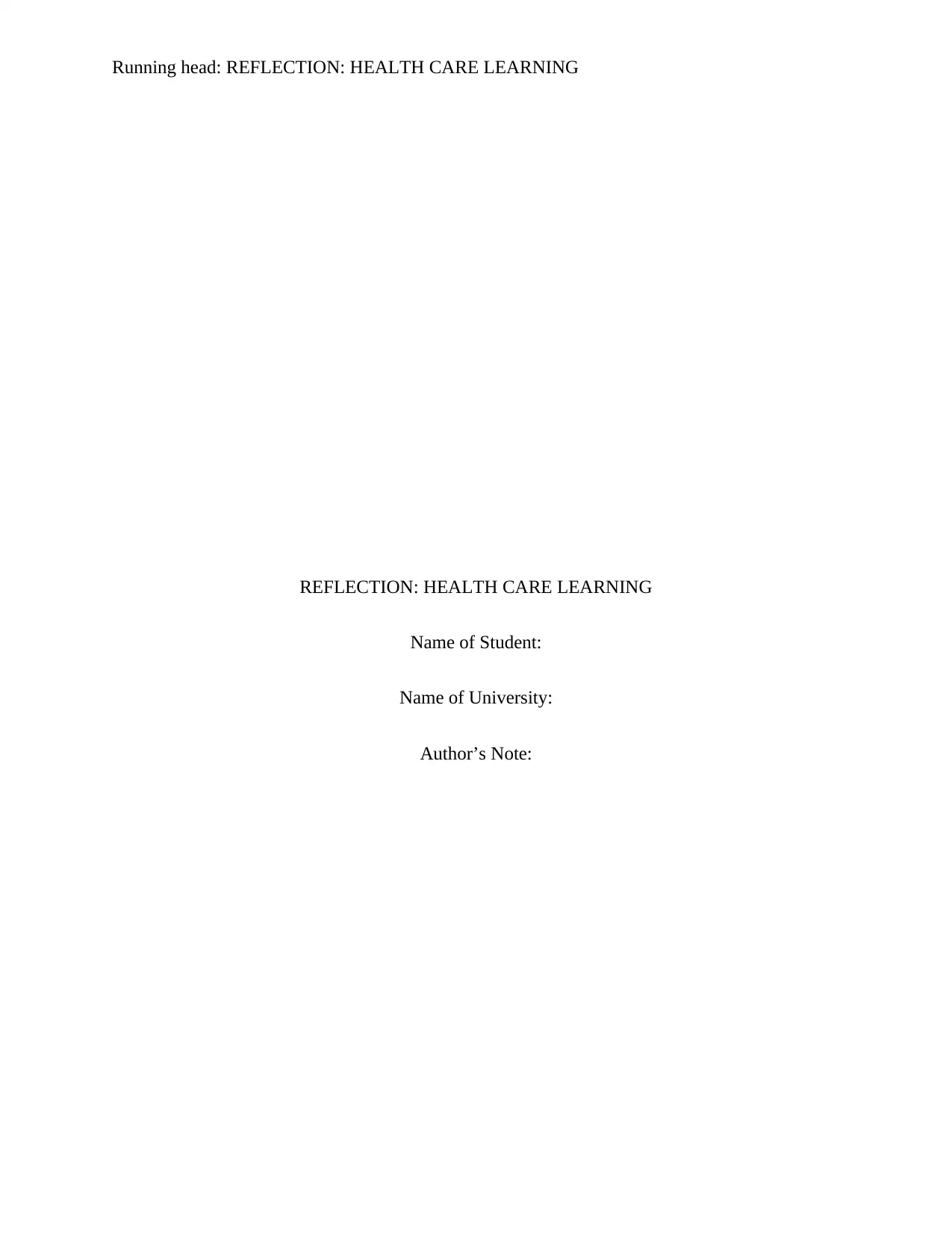
Running head: REFLECTION: HEALTH CARE LEARNING
REFLECTION: HEALTH CARE LEARNING
Name of Student:
Name of University:
Author’s Note:
REFLECTION: HEALTH CARE LEARNING
Name of Student:
Name of University:
Author’s Note:
Paraphrase This Document
Need a fresh take? Get an instant paraphrase of this document with our AI Paraphraser
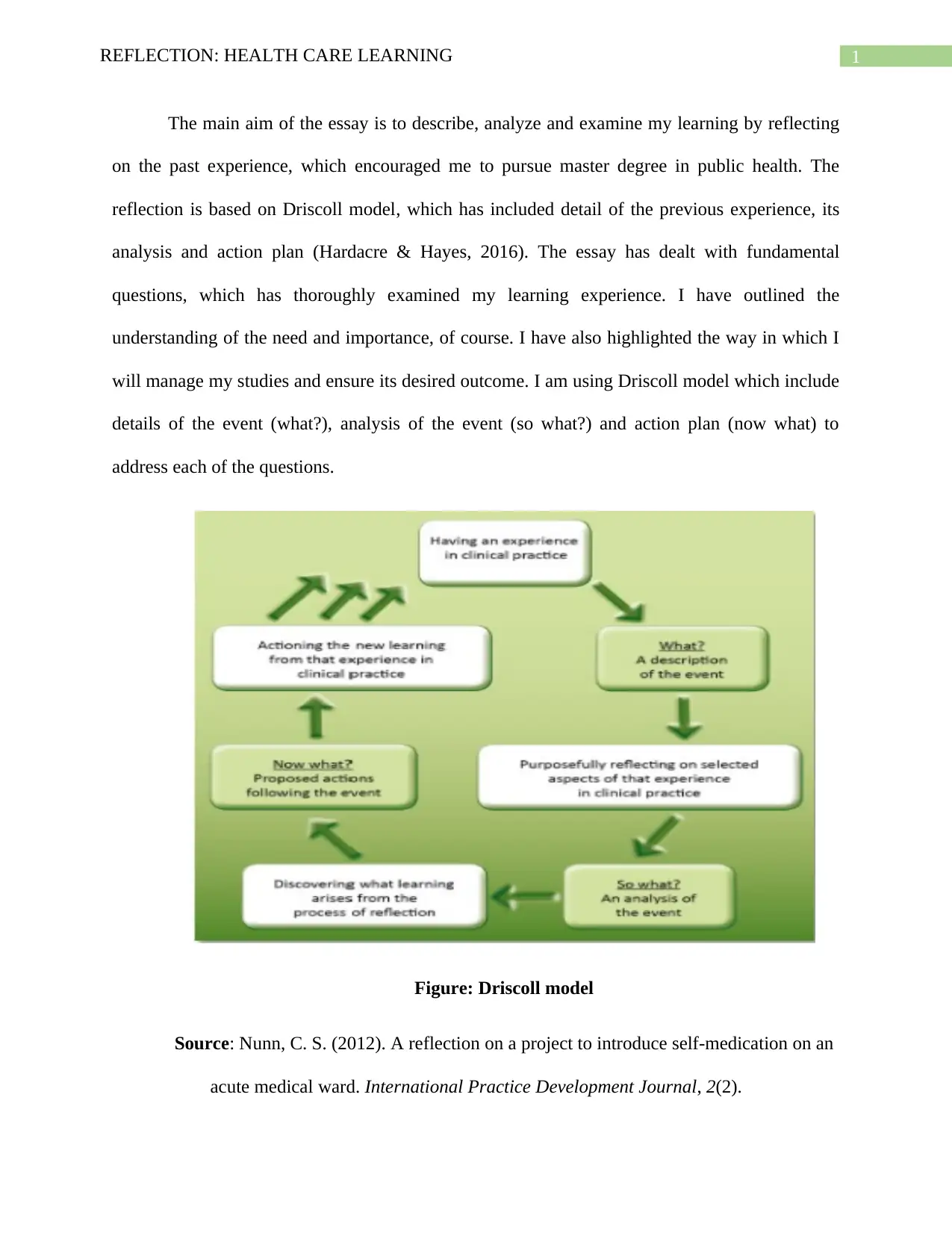
1REFLECTION: HEALTH CARE LEARNING
The main aim of the essay is to describe, analyze and examine my learning by reflecting
on the past experience, which encouraged me to pursue master degree in public health. The
reflection is based on Driscoll model, which has included detail of the previous experience, its
analysis and action plan (Hardacre & Hayes, 2016). The essay has dealt with fundamental
questions, which has thoroughly examined my learning experience. I have outlined the
understanding of the need and importance, of course. I have also highlighted the way in which I
will manage my studies and ensure its desired outcome. I am using Driscoll model which include
details of the event (what?), analysis of the event (so what?) and action plan (now what) to
address each of the questions.
Figure: Driscoll model
Source: Nunn, C. S. (2012). A reflection on a project to introduce self-medication on an
acute medical ward. International Practice Development Journal, 2(2).
The main aim of the essay is to describe, analyze and examine my learning by reflecting
on the past experience, which encouraged me to pursue master degree in public health. The
reflection is based on Driscoll model, which has included detail of the previous experience, its
analysis and action plan (Hardacre & Hayes, 2016). The essay has dealt with fundamental
questions, which has thoroughly examined my learning experience. I have outlined the
understanding of the need and importance, of course. I have also highlighted the way in which I
will manage my studies and ensure its desired outcome. I am using Driscoll model which include
details of the event (what?), analysis of the event (so what?) and action plan (now what) to
address each of the questions.
Figure: Driscoll model
Source: Nunn, C. S. (2012). A reflection on a project to introduce self-medication on an
acute medical ward. International Practice Development Journal, 2(2).
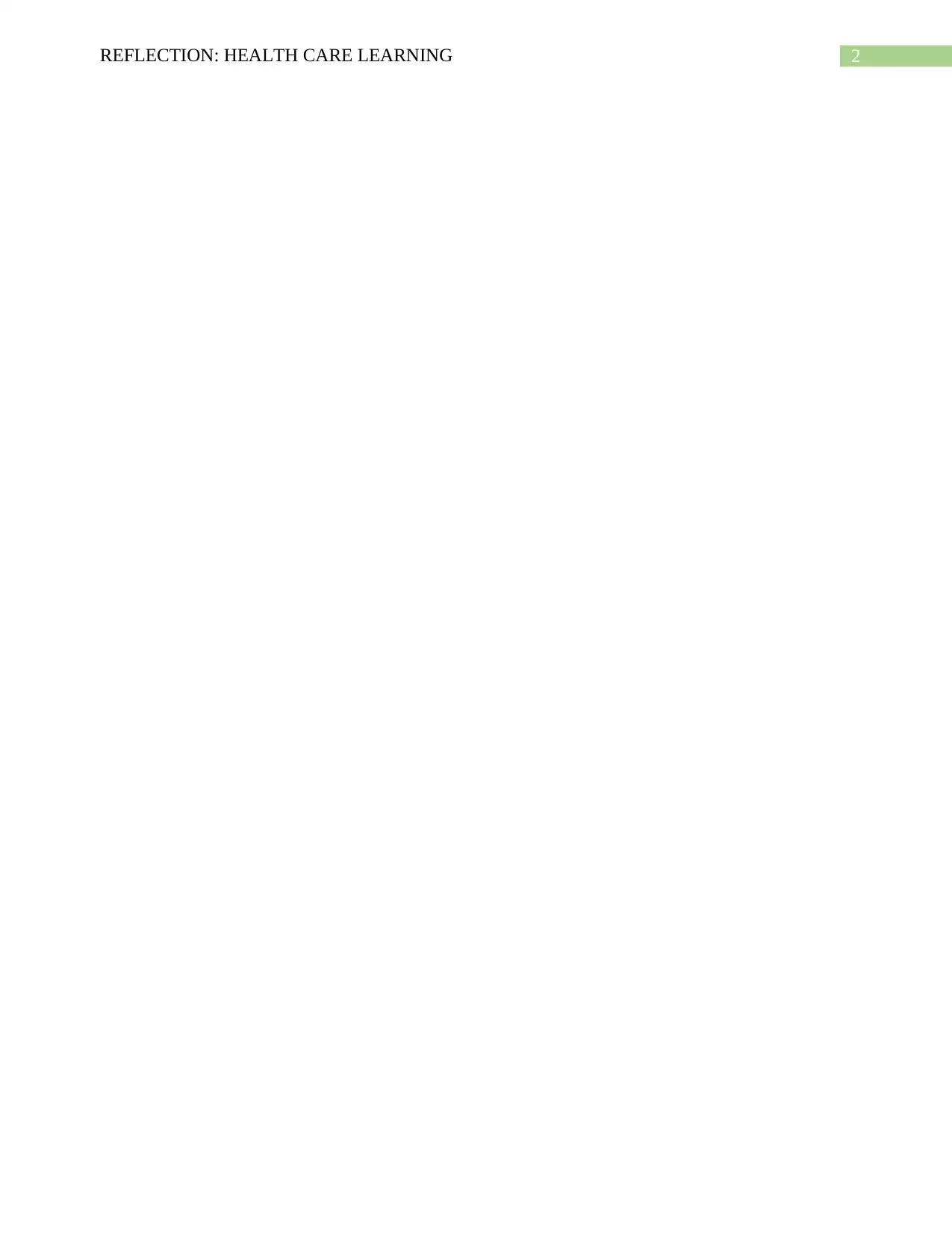
2REFLECTION: HEALTH CARE LEARNING
⊘ This is a preview!⊘
Do you want full access?
Subscribe today to unlock all pages.

Trusted by 1+ million students worldwide
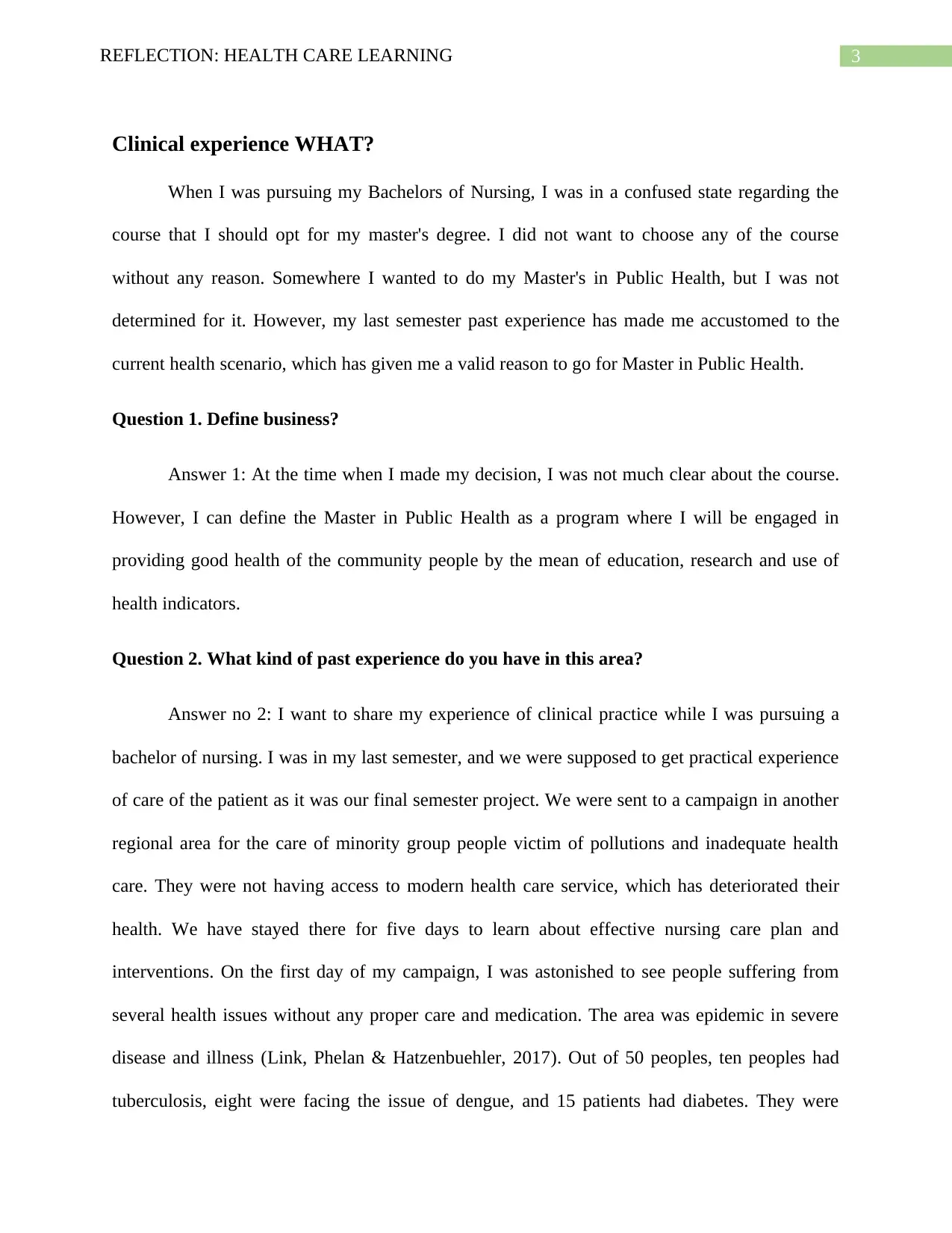
3REFLECTION: HEALTH CARE LEARNING
Clinical experience WHAT?
When I was pursuing my Bachelors of Nursing, I was in a confused state regarding the
course that I should opt for my master's degree. I did not want to choose any of the course
without any reason. Somewhere I wanted to do my Master's in Public Health, but I was not
determined for it. However, my last semester past experience has made me accustomed to the
current health scenario, which has given me a valid reason to go for Master in Public Health.
Question 1. Define business?
Answer 1: At the time when I made my decision, I was not much clear about the course.
However, I can define the Master in Public Health as a program where I will be engaged in
providing good health of the community people by the mean of education, research and use of
health indicators.
Question 2. What kind of past experience do you have in this area?
Answer no 2: I want to share my experience of clinical practice while I was pursuing a
bachelor of nursing. I was in my last semester, and we were supposed to get practical experience
of care of the patient as it was our final semester project. We were sent to a campaign in another
regional area for the care of minority group people victim of pollutions and inadequate health
care. They were not having access to modern health care service, which has deteriorated their
health. We have stayed there for five days to learn about effective nursing care plan and
interventions. On the first day of my campaign, I was astonished to see people suffering from
several health issues without any proper care and medication. The area was epidemic in severe
disease and illness (Link, Phelan & Hatzenbuehler, 2017). Out of 50 peoples, ten peoples had
tuberculosis, eight were facing the issue of dengue, and 15 patients had diabetes. They were
Clinical experience WHAT?
When I was pursuing my Bachelors of Nursing, I was in a confused state regarding the
course that I should opt for my master's degree. I did not want to choose any of the course
without any reason. Somewhere I wanted to do my Master's in Public Health, but I was not
determined for it. However, my last semester past experience has made me accustomed to the
current health scenario, which has given me a valid reason to go for Master in Public Health.
Question 1. Define business?
Answer 1: At the time when I made my decision, I was not much clear about the course.
However, I can define the Master in Public Health as a program where I will be engaged in
providing good health of the community people by the mean of education, research and use of
health indicators.
Question 2. What kind of past experience do you have in this area?
Answer no 2: I want to share my experience of clinical practice while I was pursuing a
bachelor of nursing. I was in my last semester, and we were supposed to get practical experience
of care of the patient as it was our final semester project. We were sent to a campaign in another
regional area for the care of minority group people victim of pollutions and inadequate health
care. They were not having access to modern health care service, which has deteriorated their
health. We have stayed there for five days to learn about effective nursing care plan and
interventions. On the first day of my campaign, I was astonished to see people suffering from
several health issues without any proper care and medication. The area was epidemic in severe
disease and illness (Link, Phelan & Hatzenbuehler, 2017). Out of 50 peoples, ten peoples had
tuberculosis, eight were facing the issue of dengue, and 15 patients had diabetes. They were
Paraphrase This Document
Need a fresh take? Get an instant paraphrase of this document with our AI Paraphraser
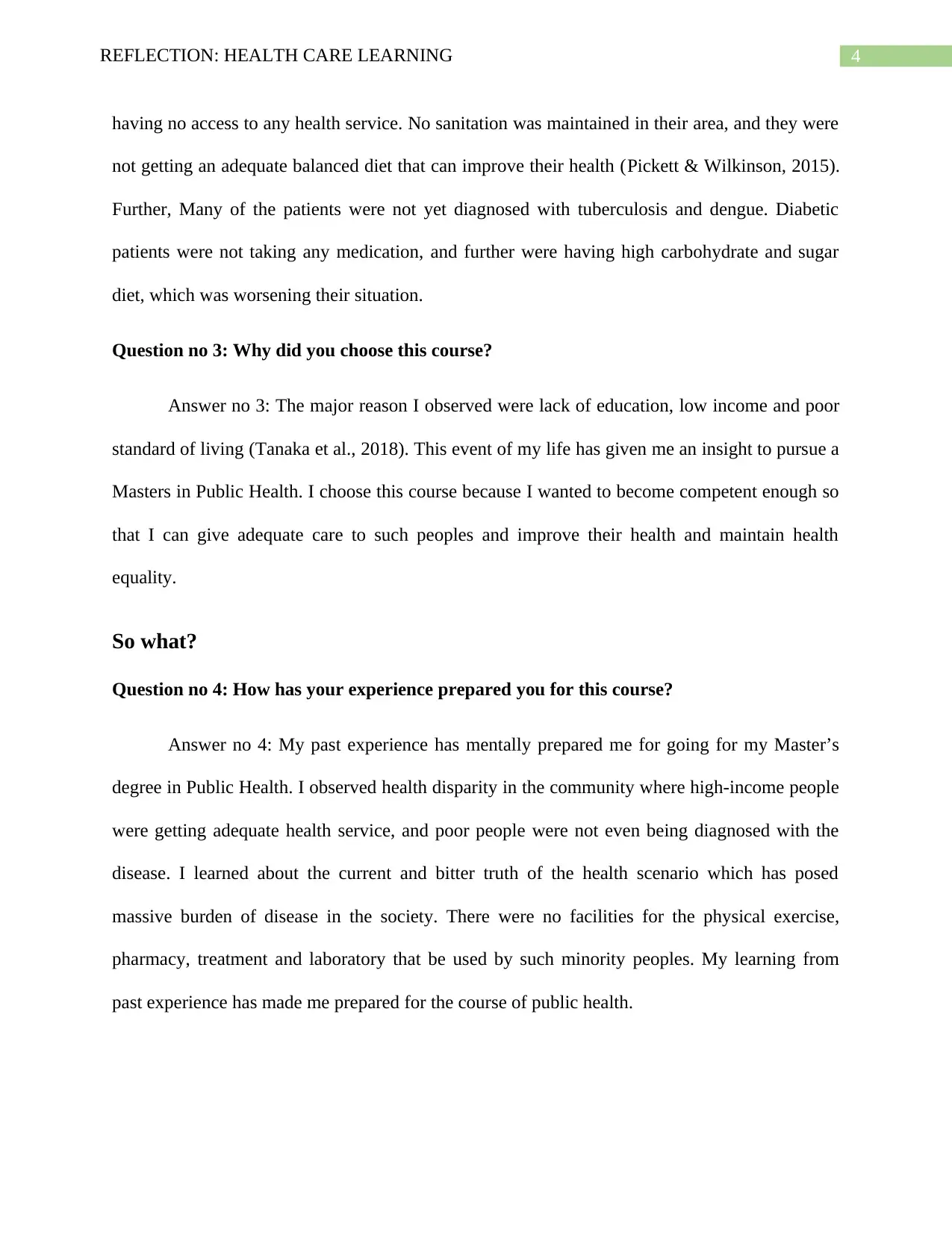
4REFLECTION: HEALTH CARE LEARNING
having no access to any health service. No sanitation was maintained in their area, and they were
not getting an adequate balanced diet that can improve their health (Pickett & Wilkinson, 2015).
Further, Many of the patients were not yet diagnosed with tuberculosis and dengue. Diabetic
patients were not taking any medication, and further were having high carbohydrate and sugar
diet, which was worsening their situation.
Question no 3: Why did you choose this course?
Answer no 3: The major reason I observed were lack of education, low income and poor
standard of living (Tanaka et al., 2018). This event of my life has given me an insight to pursue a
Masters in Public Health. I choose this course because I wanted to become competent enough so
that I can give adequate care to such peoples and improve their health and maintain health
equality.
So what?
Question no 4: How has your experience prepared you for this course?
Answer no 4: My past experience has mentally prepared me for going for my Master’s
degree in Public Health. I observed health disparity in the community where high-income people
were getting adequate health service, and poor people were not even being diagnosed with the
disease. I learned about the current and bitter truth of the health scenario which has posed
massive burden of disease in the society. There were no facilities for the physical exercise,
pharmacy, treatment and laboratory that be used by such minority peoples. My learning from
past experience has made me prepared for the course of public health.
having no access to any health service. No sanitation was maintained in their area, and they were
not getting an adequate balanced diet that can improve their health (Pickett & Wilkinson, 2015).
Further, Many of the patients were not yet diagnosed with tuberculosis and dengue. Diabetic
patients were not taking any medication, and further were having high carbohydrate and sugar
diet, which was worsening their situation.
Question no 3: Why did you choose this course?
Answer no 3: The major reason I observed were lack of education, low income and poor
standard of living (Tanaka et al., 2018). This event of my life has given me an insight to pursue a
Masters in Public Health. I choose this course because I wanted to become competent enough so
that I can give adequate care to such peoples and improve their health and maintain health
equality.
So what?
Question no 4: How has your experience prepared you for this course?
Answer no 4: My past experience has mentally prepared me for going for my Master’s
degree in Public Health. I observed health disparity in the community where high-income people
were getting adequate health service, and poor people were not even being diagnosed with the
disease. I learned about the current and bitter truth of the health scenario which has posed
massive burden of disease in the society. There were no facilities for the physical exercise,
pharmacy, treatment and laboratory that be used by such minority peoples. My learning from
past experience has made me prepared for the course of public health.
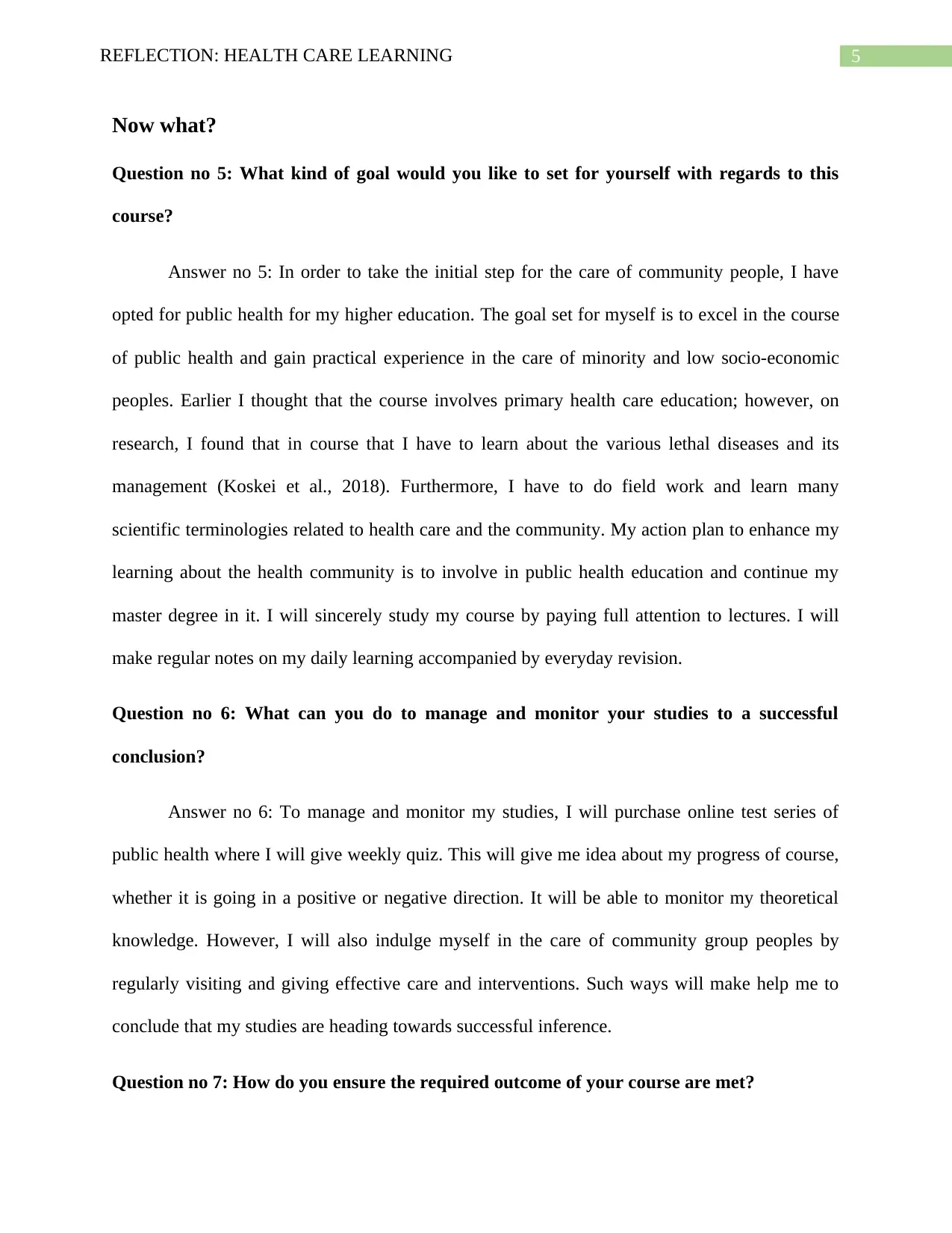
5REFLECTION: HEALTH CARE LEARNING
Now what?
Question no 5: What kind of goal would you like to set for yourself with regards to this
course?
Answer no 5: In order to take the initial step for the care of community people, I have
opted for public health for my higher education. The goal set for myself is to excel in the course
of public health and gain practical experience in the care of minority and low socio-economic
peoples. Earlier I thought that the course involves primary health care education; however, on
research, I found that in course that I have to learn about the various lethal diseases and its
management (Koskei et al., 2018). Furthermore, I have to do field work and learn many
scientific terminologies related to health care and the community. My action plan to enhance my
learning about the health community is to involve in public health education and continue my
master degree in it. I will sincerely study my course by paying full attention to lectures. I will
make regular notes on my daily learning accompanied by everyday revision.
Question no 6: What can you do to manage and monitor your studies to a successful
conclusion?
Answer no 6: To manage and monitor my studies, I will purchase online test series of
public health where I will give weekly quiz. This will give me idea about my progress of course,
whether it is going in a positive or negative direction. It will be able to monitor my theoretical
knowledge. However, I will also indulge myself in the care of community group peoples by
regularly visiting and giving effective care and interventions. Such ways will make help me to
conclude that my studies are heading towards successful inference.
Question no 7: How do you ensure the required outcome of your course are met?
Now what?
Question no 5: What kind of goal would you like to set for yourself with regards to this
course?
Answer no 5: In order to take the initial step for the care of community people, I have
opted for public health for my higher education. The goal set for myself is to excel in the course
of public health and gain practical experience in the care of minority and low socio-economic
peoples. Earlier I thought that the course involves primary health care education; however, on
research, I found that in course that I have to learn about the various lethal diseases and its
management (Koskei et al., 2018). Furthermore, I have to do field work and learn many
scientific terminologies related to health care and the community. My action plan to enhance my
learning about the health community is to involve in public health education and continue my
master degree in it. I will sincerely study my course by paying full attention to lectures. I will
make regular notes on my daily learning accompanied by everyday revision.
Question no 6: What can you do to manage and monitor your studies to a successful
conclusion?
Answer no 6: To manage and monitor my studies, I will purchase online test series of
public health where I will give weekly quiz. This will give me idea about my progress of course,
whether it is going in a positive or negative direction. It will be able to monitor my theoretical
knowledge. However, I will also indulge myself in the care of community group peoples by
regularly visiting and giving effective care and interventions. Such ways will make help me to
conclude that my studies are heading towards successful inference.
Question no 7: How do you ensure the required outcome of your course are met?
⊘ This is a preview!⊘
Do you want full access?
Subscribe today to unlock all pages.

Trusted by 1+ million students worldwide
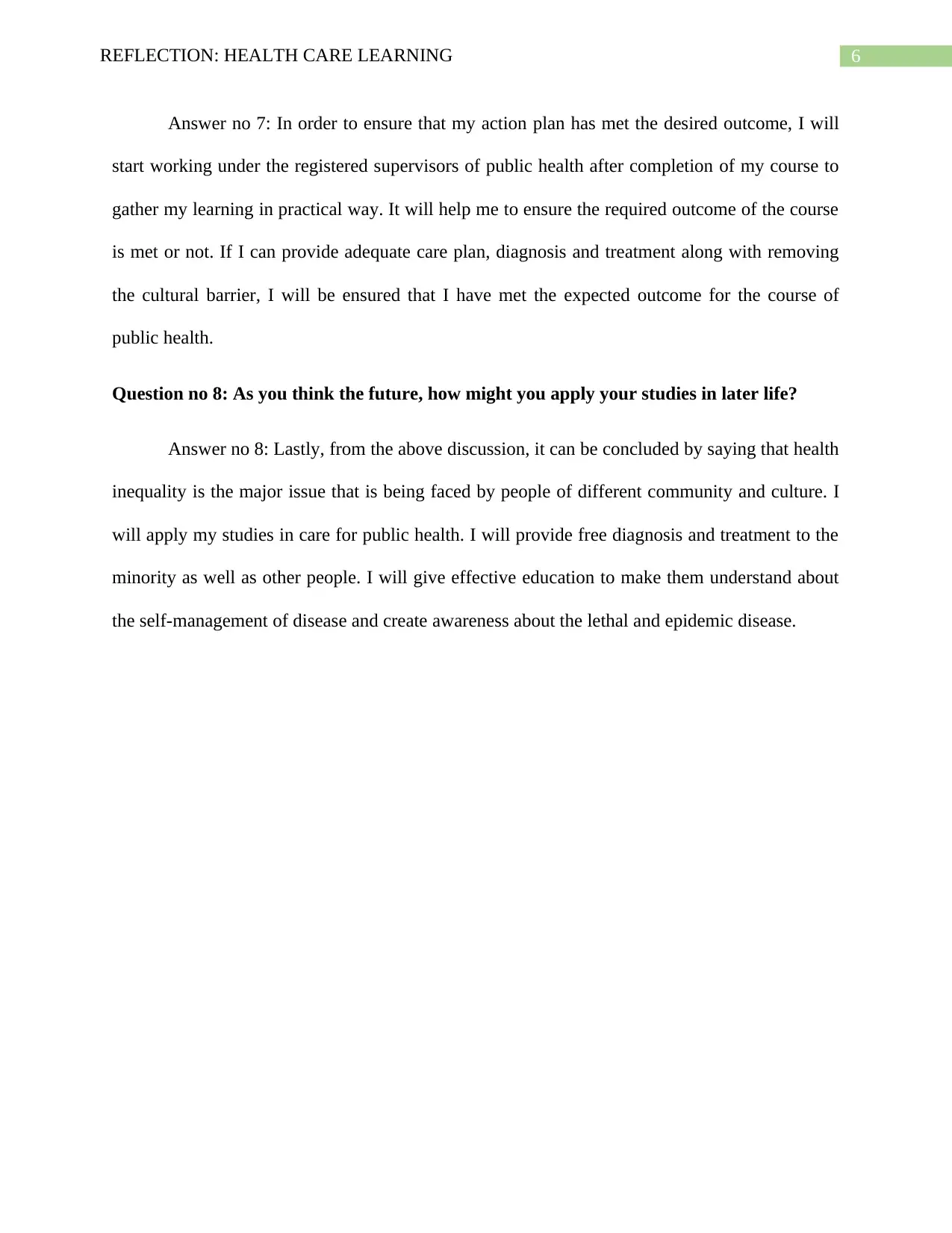
6REFLECTION: HEALTH CARE LEARNING
Answer no 7: In order to ensure that my action plan has met the desired outcome, I will
start working under the registered supervisors of public health after completion of my course to
gather my learning in practical way. It will help me to ensure the required outcome of the course
is met or not. If I can provide adequate care plan, diagnosis and treatment along with removing
the cultural barrier, I will be ensured that I have met the expected outcome for the course of
public health.
Question no 8: As you think the future, how might you apply your studies in later life?
Answer no 8: Lastly, from the above discussion, it can be concluded by saying that health
inequality is the major issue that is being faced by people of different community and culture. I
will apply my studies in care for public health. I will provide free diagnosis and treatment to the
minority as well as other people. I will give effective education to make them understand about
the self-management of disease and create awareness about the lethal and epidemic disease.
Answer no 7: In order to ensure that my action plan has met the desired outcome, I will
start working under the registered supervisors of public health after completion of my course to
gather my learning in practical way. It will help me to ensure the required outcome of the course
is met or not. If I can provide adequate care plan, diagnosis and treatment along with removing
the cultural barrier, I will be ensured that I have met the expected outcome for the course of
public health.
Question no 8: As you think the future, how might you apply your studies in later life?
Answer no 8: Lastly, from the above discussion, it can be concluded by saying that health
inequality is the major issue that is being faced by people of different community and culture. I
will apply my studies in care for public health. I will provide free diagnosis and treatment to the
minority as well as other people. I will give effective education to make them understand about
the self-management of disease and create awareness about the lethal and epidemic disease.
Paraphrase This Document
Need a fresh take? Get an instant paraphrase of this document with our AI Paraphraser
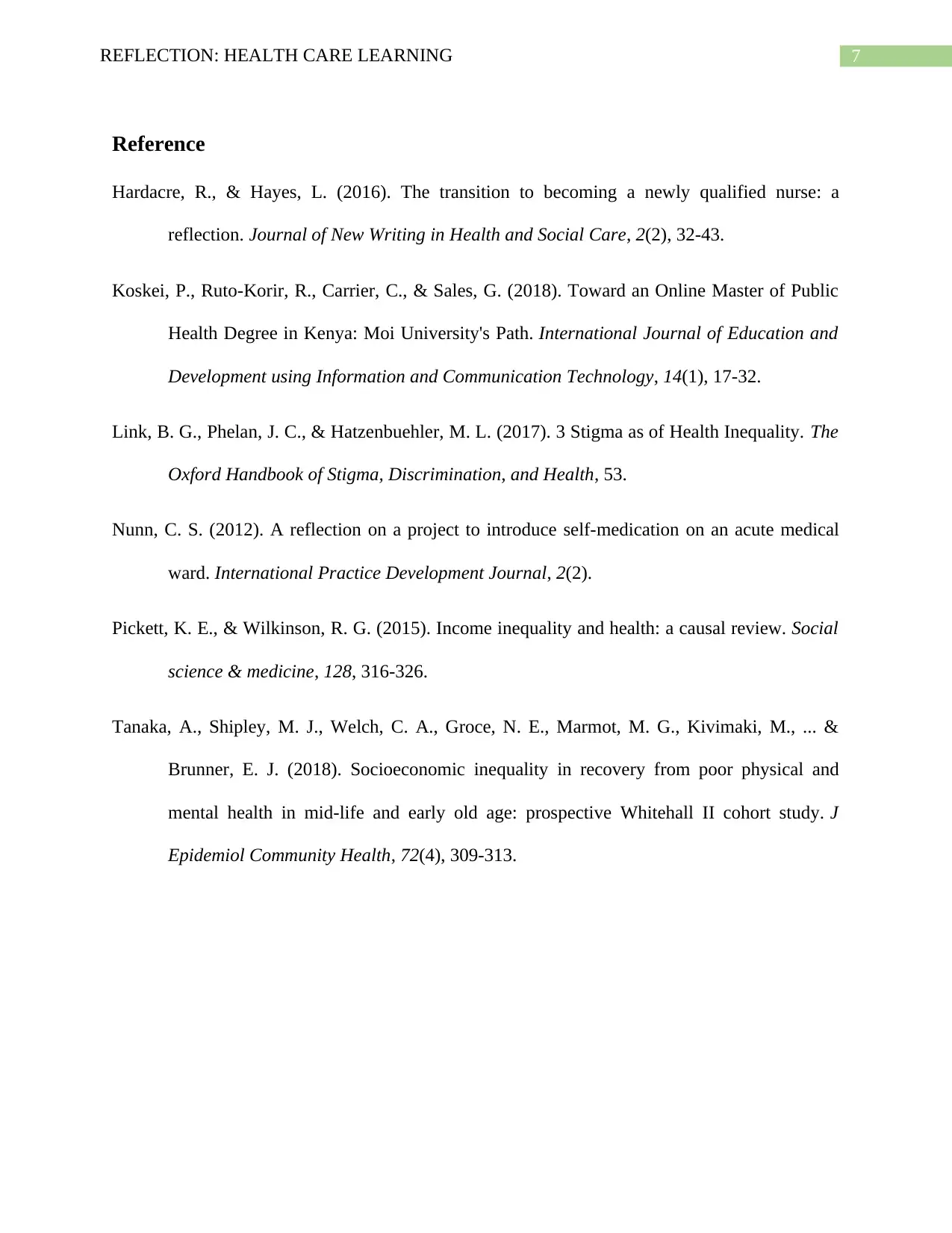
7REFLECTION: HEALTH CARE LEARNING
Reference
Hardacre, R., & Hayes, L. (2016). The transition to becoming a newly qualified nurse: a
reflection. Journal of New Writing in Health and Social Care, 2(2), 32-43.
Koskei, P., Ruto-Korir, R., Carrier, C., & Sales, G. (2018). Toward an Online Master of Public
Health Degree in Kenya: Moi University's Path. International Journal of Education and
Development using Information and Communication Technology, 14(1), 17-32.
Link, B. G., Phelan, J. C., & Hatzenbuehler, M. L. (2017). 3 Stigma as of Health Inequality. The
Oxford Handbook of Stigma, Discrimination, and Health, 53.
Nunn, C. S. (2012). A reflection on a project to introduce self-medication on an acute medical
ward. International Practice Development Journal, 2(2).
Pickett, K. E., & Wilkinson, R. G. (2015). Income inequality and health: a causal review. Social
science & medicine, 128, 316-326.
Tanaka, A., Shipley, M. J., Welch, C. A., Groce, N. E., Marmot, M. G., Kivimaki, M., ... &
Brunner, E. J. (2018). Socioeconomic inequality in recovery from poor physical and
mental health in mid-life and early old age: prospective Whitehall II cohort study. J
Epidemiol Community Health, 72(4), 309-313.
Reference
Hardacre, R., & Hayes, L. (2016). The transition to becoming a newly qualified nurse: a
reflection. Journal of New Writing in Health and Social Care, 2(2), 32-43.
Koskei, P., Ruto-Korir, R., Carrier, C., & Sales, G. (2018). Toward an Online Master of Public
Health Degree in Kenya: Moi University's Path. International Journal of Education and
Development using Information and Communication Technology, 14(1), 17-32.
Link, B. G., Phelan, J. C., & Hatzenbuehler, M. L. (2017). 3 Stigma as of Health Inequality. The
Oxford Handbook of Stigma, Discrimination, and Health, 53.
Nunn, C. S. (2012). A reflection on a project to introduce self-medication on an acute medical
ward. International Practice Development Journal, 2(2).
Pickett, K. E., & Wilkinson, R. G. (2015). Income inequality and health: a causal review. Social
science & medicine, 128, 316-326.
Tanaka, A., Shipley, M. J., Welch, C. A., Groce, N. E., Marmot, M. G., Kivimaki, M., ... &
Brunner, E. J. (2018). Socioeconomic inequality in recovery from poor physical and
mental health in mid-life and early old age: prospective Whitehall II cohort study. J
Epidemiol Community Health, 72(4), 309-313.
1 out of 8
Related Documents
Your All-in-One AI-Powered Toolkit for Academic Success.
+13062052269
info@desklib.com
Available 24*7 on WhatsApp / Email
![[object Object]](/_next/static/media/star-bottom.7253800d.svg)
Unlock your academic potential
Copyright © 2020–2026 A2Z Services. All Rights Reserved. Developed and managed by ZUCOL.


